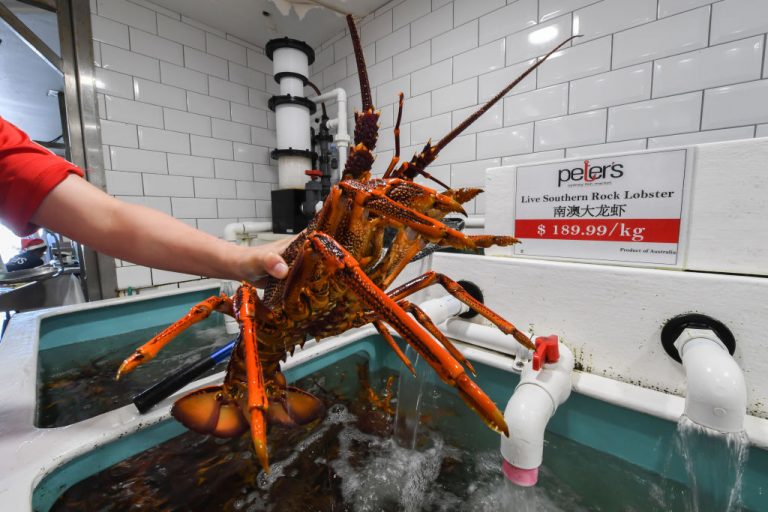Authorities in Hong Kong have seized more than 4,000 pounds of live rock lobsters and sea cucumbers believed to have been heading to mainland China. Last year, the Chinese regime instituted a restriction on the import of Australian crustaceans amidst rising tensions between the two nations.
According to data shared by Hong Kong’s customs department, officials seized over 1,900 pounds of lobsters and 2,050 pounds of sea cucumbers valued at around HK$10 million (US$1.3 million). The goods were found in a twin-engine speed boat that was attempting to leave Hong Kong at night. Two men were arrested for being part of the operation.
Lui Siu-fai, an official at the customs department, stated at a news conference that the seized boxes were not labeled and that the origin of the smuggled goods remains unknown. “I believe that most of the smuggled goods were (to be) shipped to mainland China,” Liu said.
Last month, Hong Kong and mainland authorities intercepted roughly $540,000 worth of smuggled Australian lobsters weighing 11,560 pounds. 13 people were arrested. Smuggling of Australian lobsters to Hong Kong has surged recently following Beijing imposing an unofficial ban on direct imports from the country. Authorities suspect much of the lobsters end up finding their way into the mainland.
In June, Hong Kong became the world’s largest importer of Australian lobsters. Between October 2020 and April 2020, Hong Kong’s lobster imports from Australia had grown by more than 20 times.
Success
You are now signed up for our newsletter
Success
Check your email to complete sign up
READ MORE: Chinese Communist Party Declares Australian Rock Lobsters a ‘National Security Threat’
READ MORE: China’s Latest COVID Claim: Virus Originated From Maine Lobsters
The unofficial ban was placed after Australia demanded an international probe into the origins of COVID-19. In addition to lobsters, other Australian imports like coal, barley, cotton, and wine were also blocked.
“We believe that smuggling syndicates might make use of improper means to smuggle Australian lobsters to mainland China to seek profit,” Rita Li of Hong Kong’s Syndicate Crimes Investigation Bureau told the Associated Press (AP).
Last month, the Hong Kong administration appointed Louise Ho as the city’s new customs commissioner. Ho immediately announced that she would crack down on lobster smuggling, insisting that the activity poses a threat to China’s national security.
“On the surface, it is a simple matter of smuggling lobsters, but these activities undermine our country’s trade restrictions against Australia… Stopping lobster smuggling is a very important part of protecting national security, so we will pursue it diligently,” Ho said to reporters.
Hong Kong an uncertain market
On Nov. 3, Australian trade minister Simon Birmingham told reporters that the country’s lobster industry had put some exports on hold until there is more certainty about the Chinese market. Rock lobsters only have a small window of time for safe delivery, thus making any disruption in supply a costly affair for the sector.
“A number of shipments through a particular port of entry have faced delays as additional testing is undertaken for metal content levels within that seafood. Australia prides ourself on being a high quality, safe exporter of premium product, and we have absolute confidence that our industry meets the type of safety standards that are necessary into whatever market is that they are exporting,” Birmingham stated. The trade minister also noted that Australia should soon recognize the “risk factor” involved in trading with China.
China’s restriction on Australian lobster imports is part of what some experts call “grayzone activities.” Back in July, Australia’s defense minister Linda Reynolds warned that Beijing was engaged in gray zone activities in her country to push through the communist regime’s interests.
“Cyber-attacks, foreign interference, and economic pressure seek to exploit the grey area between peace and war… In the grey zone, when the screws are tightened: influence becomes interference, economic cooperation becomes coercion, and investment becomes entrapment,” Reynolds stated.














